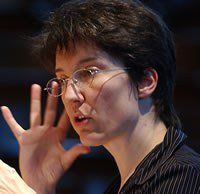
You have no items in your cart


1. Sarah
Reference: V77-1
CHF19.00
(minimum
10 copies)

This cycle Femmes de Jérusalem (Women of Jerusalem) has been commissioned by the vocal ensemble DeMusica and its director Marc Bochud for the celebration of the 20ieth anniversary of the ensemble, and was premiered in September 2006 in Freiburg (Switzerland).
Marie-Claire Dewarrat has written the texts specially for this occasion. She has chosen these women because they are the greatest “symbol bearers and the most dedicated to provoke contemporary resonances”. The cycle includes five pieces:
1. Sarah, “the one who susurrates”
She is an angry, embittered woman, desperately disappointet because her husband Abraham preferred his maidservant, but she is also idolising Isaac, her «Angel» of son. The main words of this piece are: «Regarde, vois» (look, see). Sarah is depicting her situation and her heartstrings: anger, bitterness, jealousy, admiration and her fear for her son’s life. This piece is the most difficult one of the cycle.
2. Maria, “the one who remains silent”
Marie-Claire Dewarrat perceives Maria as a mute, voiceless woman. In the text, the voice of Maria is alternating with excerpts of latin texts (Ave Maria, Salve Regina, Magnificat, Agnus Dei, etc). I have chosen two modi to express this consternation, this voicelessness and also the fervour and the bright devoutness. In the third verse french and latin languages are combined.
3. Maria of Magdala, “the beckoning one”
She is the sister of Lazarus and Martha, a women whose portrait has changed over the centuries. Witness of the life, death and the rising of Jesus, perhaps his companion, later on depicted as a sinner. Marie-Claire Dewarrat describes her as a a pleasure- and love-seeking person.
4. Veronica, “the witnessing one”
By reading Marie-Claire Dewarrat,’s text, I saw the Christ carrying his Cross, and I imagined Veronica’s chant as a lullaby.
5. Martha, “the supplicator”.
For me an enervating personality, constantly foregrounding her work and lack of time. Therefore, I have decided to make her running from the beginning to the end.